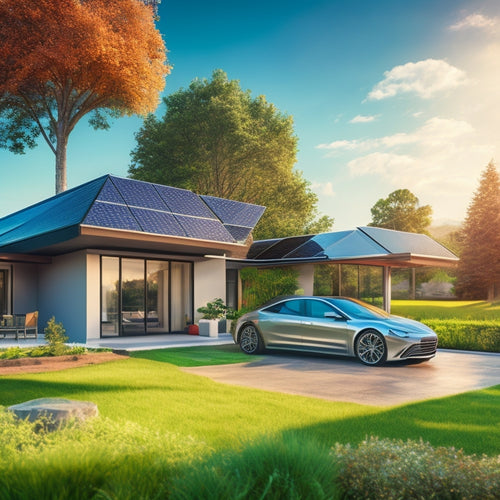
Top Home Battery Backup Systems for Renewable Energy
Share
You're looking for a high-quality home battery backup system to optimize your renewable energy setup, and industry leaders like Tesla, LG, and Sonnen offer high-performance solutions with manufacturer warranties and dedicated customer support. When selecting a system, consider key features like power capacity, depth of discharge, and cycle life to guarantee a tailored fit for your needs. As you explore options, keep in mind that proper installation, maintenance, and upgrades are essential for maximizing efficiency and minimizing costs. With the right system, you'll tap into the full potential of renewable energy and experience increased efficiency, reduced emissions, and improved reliability - and there's more to discover.
Key Takeaways
• Top brands like Tesla, LG, and Sonnen offer high-quality battery backup systems with manufacturer warranties and accessible customer support.
• Consider power capacity, depth of discharge, cycle life, and warranty options when selecting a battery backup system for your renewable energy needs.
• Different battery types, such as deep cycle, lithium-ion, and flow batteries, offer varying performance characteristics and energy storage capabilities.
• Proper system sizing, local incentives, and maximum power load determination are crucial for choosing the best battery backup system for your renewable energy setup.
• Regular maintenance, software upgrades, and budgeting for component replacements are essential to ensure optimal system performance and longevity.
Top Battery Backup System Brands
When choosing a home battery backup system, you'll want to explore top brands that offer reliable performance, efficient energy storage, and seamless integration with your renewable energy source.
In the world of home battery backup systems, brand reputation matters. Industry leaders like Tesla, LG, and Sonnen have built a reputation for delivering high-quality products that meet the unique needs of homeowners.
These brands offer manufacturer warranties that provide peace of mind and protect your investment. But what really sets them apart is their commitment to product customization. Whether you need a system that integrates with your solar panels or one that provides backup power during outages, these brands offer tailored solutions.
And when you need support, their customer support teams are just a call away. What's more, these brands are constantly pushing the boundaries of technology advancements, ensuring that their products stay ahead of the curve.
Key Features to Consider
As you shop for a home battery backup system, you'll need to weigh the importance of key features that impact performance, cost, and convenience. These include round-trip efficiency, depth of discharge, and battery management systems.
When evaluating your options, consider the following key features:
-
Power Capacity: How much power do you need to back up your home? Look for systems with scalable power capacity to fit your needs.
-
Depth of Discharge (DOD): How much of the battery's capacity can be safely used? A higher DOD means more usable energy.
-
Cycle Life: How many charge/discharge cycles can the battery handle? A longer cycle life means a longer-lasting battery.
-
Warranty Options: What kind of warranty and support does the manufacturer offer?
-
Battery Type and Operating Range: What type of battery is used, and what's the operating temperature range? This affects performance, safety, and lifespan.
Types of Solar Battery Options
You'll find that home battery backup systems utilize various types of solar battery options, each with distinct characteristics that impact performance, durability, and cost.
When it comes to solar battery options, you've got a range of choices, each with its strengths and weaknesses. Deep Cycle batteries, for instance, are designed to provide a steady flow of energy over a longer period, making them ideal for off-grid systems.
Then there's the Battery Chemistry, which plays a vital role in determining the overall performance of your solar battery system. You've also got Grid Scale batteries, designed for large-scale energy storage, and Flow Batteries, which store energy in a liquid electrolyte solution.
If you're looking for a more environmentally friendly option, Saltwater Batteries might be the way to go. But let's not forget the trusty Lead Acid batteries, a classic choice for many solar applications.
And then, of course, there's the Lithium Ion option, offering high Energy Density and a longer lifespan. With so many options, understanding the pros and cons of each is important to make an informed decision for your renewable energy system.
How to Choose the Best System
To guarantee a smooth shift to renewable energy, choosing the best home battery backup system for your specific needs is crucial. It starts with evaluating your energy requirements and consumption patterns. You need to understand how much energy you're using, when you're using it, and how much you can save.
Here are some key factors to keep in mind when selecting the best system for you:
-
Conduct an energy audit: Assess your energy usage patterns to determine your energy needs.
-
System sizing: Calculate the right size of your battery backup system based on your energy requirements.
-
Check local incentives: Look for local rebates, tax credits, or other incentives that can help offset the cost of your system.
-
Load calculation: Determine the maximum power load your system needs to handle during peak usage.
-
System integration: Make sure your battery backup system integrates seamlessly with your existing solar panel system or renewable energy source.
Installation and Maintenance Costs
When considering a home battery backup system, you'll want to factor in the installation and maintenance costs that come with it.
These costs can be broken down into three key areas: the initial investment required to get your system up and running, the costs associated with replacing system components over time, and the ongoing maintenance needs that'll keep your system running efficiently.
Initial Investment Costs
Installing a home battery backup system for renewable energy requires a substantial upfront investment, with costs varying widely depending on the system's size, type, and features. As you contemplate investing in a home battery backup system, it's vital to understand the initial investment costs involved.
Here are some key factors to ponder when planning your financial investment:
-
System size and type: The larger the system, the higher the cost. Lithium-ion batteries, for instance, are generally more expensive than lead-acid batteries.
-
Installation costs: Labor costs, permits, and inspections can add up quickly, so be sure to factor these in when planning your budget.
-
Inverter and charger costs: The type and quality of the inverter and charger can significantly impact the overall cost of the system.
-
Monitoring and control systems: The cost of monitoring and control systems can vary depending on the level of sophistication and features.
-
Certifications and warranties: Look for systems with certifications like UL and IEC, and consider the cost of warranties and maintenance agreements.
When it comes to financial planning, a thorough cost comparison can help you make an informed decision. By understanding the initial investment costs, you can better plan for the long-term benefits of your home battery backup system.
System Replacement Costs
You'll need to budget for system replacement costs, including installation and maintenance expenses, which can add up over the lifespan of your home battery backup system. It's crucial to factor in these costs to make sure you're prepared for the long haul. After all, your system won't last forever – its battery lifespan is limited, and eventually, you'll need to replace it.
Here's a breakdown of the typical replacement costs you can expect:
| Component | Replacement Cost |
|---|---|
| Battery | $5,000 - $10,000 |
| Inverter/Converter | $1,500 - $3,000 |
| Electrical Panel | $500 - $1,000 |
| Monitoring System | $200 - $500 |
When conducting a cost analysis, remember that these expenses will vary depending on your system's size, complexity, and manufacturer. Be sure to research the specific replacement costs for your system to get an accurate estimate. By factoring in these costs, you'll be better equipped to budget for the long-term maintenance of your home battery backup system.
Ongoing Maintenance Needs
When factoring in system replacement costs, it's equally important to take into account the ongoing maintenance needs of your home battery backup system, including installation and maintenance costs that will arise throughout its lifespan. You'll want to take into consideration the costs of regular checkups, scheduled upgrades, and any repairs that may be needed to keep your system running efficiently.
Here are some maintenance tasks you'll need to budget for:
-
Regular Checkups: Schedule annual or bi-annual inspections to make sure your system is functioning correctly and identify any potential issues before they become major problems.
-
Scheduled Upgrades: Plan for software and hardware upgrades to keep your system up-to-date and make sure compatibility with changing renewable energy sources.
-
Battery Maintenance: Monitor and maintain the health of your batteries to extend their lifespan and optimize performance.
-
Component Replacement: Budget for replacing worn-out or damaged components, such as inverters or charge controllers.
-
Emergency Repairs: Set aside funds for unexpected repairs, like fixing a faulty electrical connection or replacing a damaged enclosure.
Benefits of Energy Storage Systems
By integrating energy storage systems into your renewable energy setup, you can access a multitude of benefits that enhance the overall efficiency and reliability of your power generation. One of the primary advantages is increased efficiency, as energy storage systems enable you to harness excess energy generated during the day for use during periods of low energy production. This not only optimizes your energy usage but also diminishes your reliance on the grid.
Here's a breakdown of the benefits:
| Benefit | Description |
|---|---|
| Increased Efficiency | Optimize energy usage and reduce waste |
| Reduced Emissions | Lower carbon footprint and contribute to a sustainable future |
| Improved Reliability | Guarantee a stable power supply during outages or grid fluctuations |
Frequently Asked Questions
Can I Use a Single Battery Backup System for Multiple Homes?
You're wondering if you can share a single battery backup system among multiple homes? While it's technically possible, creating a neighborhood sharing or multi-home network, it's important to take into account individual energy demands and grid connections before making it a reality.
Are Home Battery Backup Systems Compatible With All Solar Panels?
You're wondering if your home battery backup system will play nice with any solar panel, right? Well, most systems are compatible, but panel compatibility varies - look for energy efficiency certifications to guarantee a harmonious match.
Do Battery Backup Systems Require Regular Software Updates?
You'll need to keep your battery backup system's software up-to-date to avoid security risks; expect to update every 3-6 months, depending on the manufacturer's recommended update frequency to guarantee seamless performance.
Can I Install a Battery Backup System on My Own?
Can you install a battery backup system on your own? Technically, yes, but be aware that DIY challenges and Safety concerns lurk around every corner, so proceed with caution (and a healthy dose of electrical know-how)!
Are Home Battery Backup Systems Covered by Homeowner's Insurance?
You'll likely need an insurance rider to cover your home battery backup system, as standard policies often exclude damage to auxiliary power systems; review your policy for exclusions and consider adding coverage to avoid costly surprises.
Related Posts
-

What Solar Panels Work Best With EVS Online?
When shopping for solar panels online to power your electric vehicle, look for high-efficiency models that can withst...
-

Why Electric Motorcycles Fail at Long-Distance Touring
You're likely familiar with the excitement of hitting the open road on an electric motorcycle, but you're also smart ...
-

Step-by-Step Guide to Converting Your Vehicle to EV
You'll begin by evaluating your vehicle's conversion potential, analyzing its weight, aerodynamics, and powertrain co...


